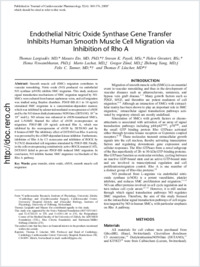Endothelial nitric oxide synthase gene transfer inhibits human smooth muscle cell migration via inhibition of Rho A
- Largiadèr, Thomas Cardiovascular Research, Institute of Physiology, University of Zürich, Switzerland
- Eto, Masato Cardiovascular Research, Institute of Physiology, University of Zürich, Switzerland - Cardiology, University Hospital Zürich Switzerland
- Payeli, Sravan K. Cardiovascular Research, Institute of Physiology, University of Zürich, Switzerland
- Greutert, Helen Cardiovascular Research, Institute of Physiology, University of Zürich, Switzerland
- Viswambharan, Hema Institute of Physiology, University of Fribourg, Switzerland
- Lachat, Mario Cardiovascular Surgery, Cardiovascular Center, University Hospital Zürich, Switzerland
- Zünd, Gregor Cardiovascular Surgery, Cardiovascular Center, University Hospital Zürich, Switzerland
- Yang, Zhihong Institute of Physiology, University of Fribourg, Switzerland
- Tanner, Felix C. Cardiovascular Research, Institute of Physiology, University of Zürich, Switzerland - Cardiology, University Hospital Zürich Switzerland
- Lüscher, Thomas F. Cardiovascular Research, Institute of Physiology, University of Zürich, Switzerland - Cardiology, University Hospital Zürich Switzerland
-
2008
Published in:
- Journal of Cardiovascular Pharmacology. - 2008, vol. 52, no. 4, p. 369-374
English
Smooth muscle cell (SMC) migration contributes to vascular remodeling. Nitric oxide (NO) produced via endothelial NO synthase (eNOS) inhibits SMC migration. This study analyzes signal transduction mechanisms of SMC migration targeted by NO. SMCs were cultured from human saphenous veins, and cell migration was studied using Boyden chambers. PDGF-BB (0.1 to 10 ng/ml) stimulated SMC migration in a concentration-dependent manner, which was inhibited by adenoviral-mediated overexpression of eNOS and by the NO donor diethylentriamine NONOate (DETANO, 10⁻⁵ to 10⁻³ mol/L). NO release was enhanced in eNOS-transduced SMCs, and L-NAME blunted the effect of eNOS overexpression on migration. PDGF-BB (10 ng/ml) activated Rho A, which was inhibited by the overexpression of eNOS by DETANO and by 8 bromo-cGMP. The inhibitory effect of DETANO on Rho A activity was prevented by the cGMP-dependant kinase inhibitor. Furthermore, inhibition of Rho A by C3 exoenzyme and inhibition of ROCK by Y-27632 diminished cell migration stimulated by PDGF-BB. Finally, in the cells overexpressing constitutively active ROCK mutant (CAT), DETANO failed to prevent PDGF-BB-induced SMC migration. In conclusion, NO inhibits human SMC migration via blockade of the Rho A pathway.
- Faculty
- Faculté des sciences et de médecine
- Department
- Département de Médecine
- Language
-
- English
- Classification
- Biological sciences
- License
-
License undefined
- Identifiers
-
- RERO DOC 12287
- DOI 10.1097/FJC.0b013e31818953d0
- Persistent URL
- https://folia.unifr.ch/unifr/documents/301283
Statistics
Document views: 132
File downloads:
- pdf: 146
